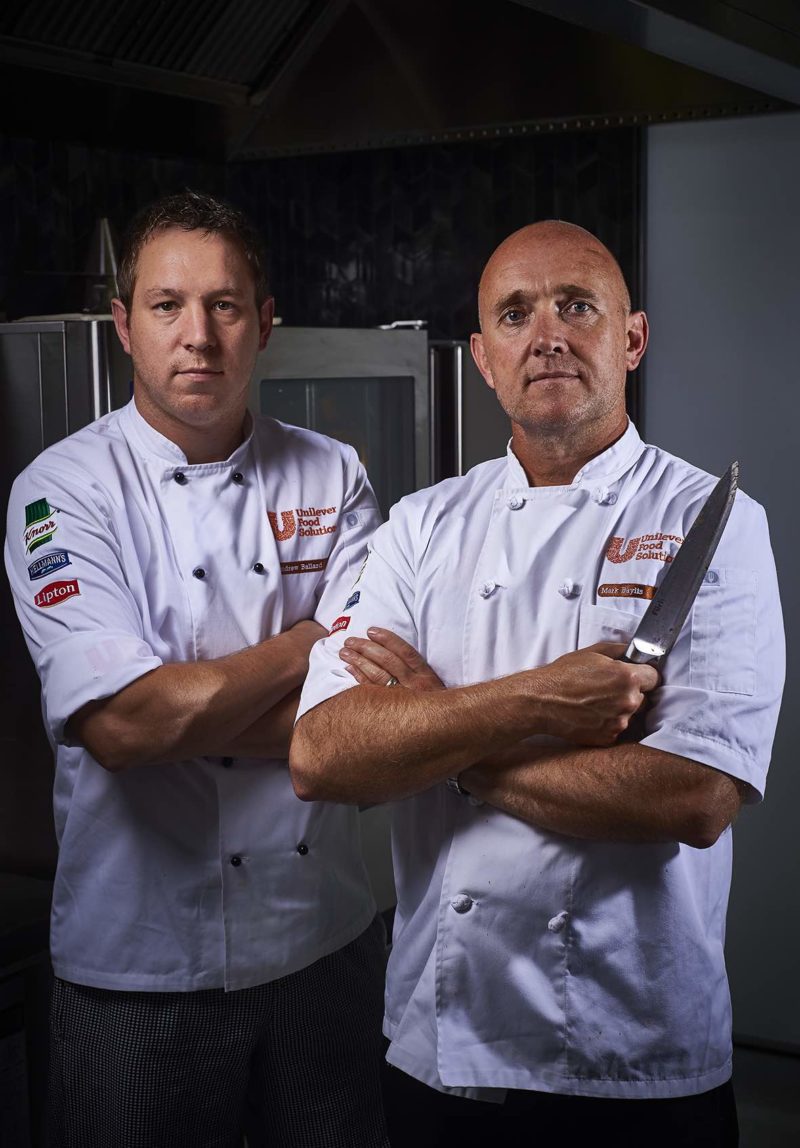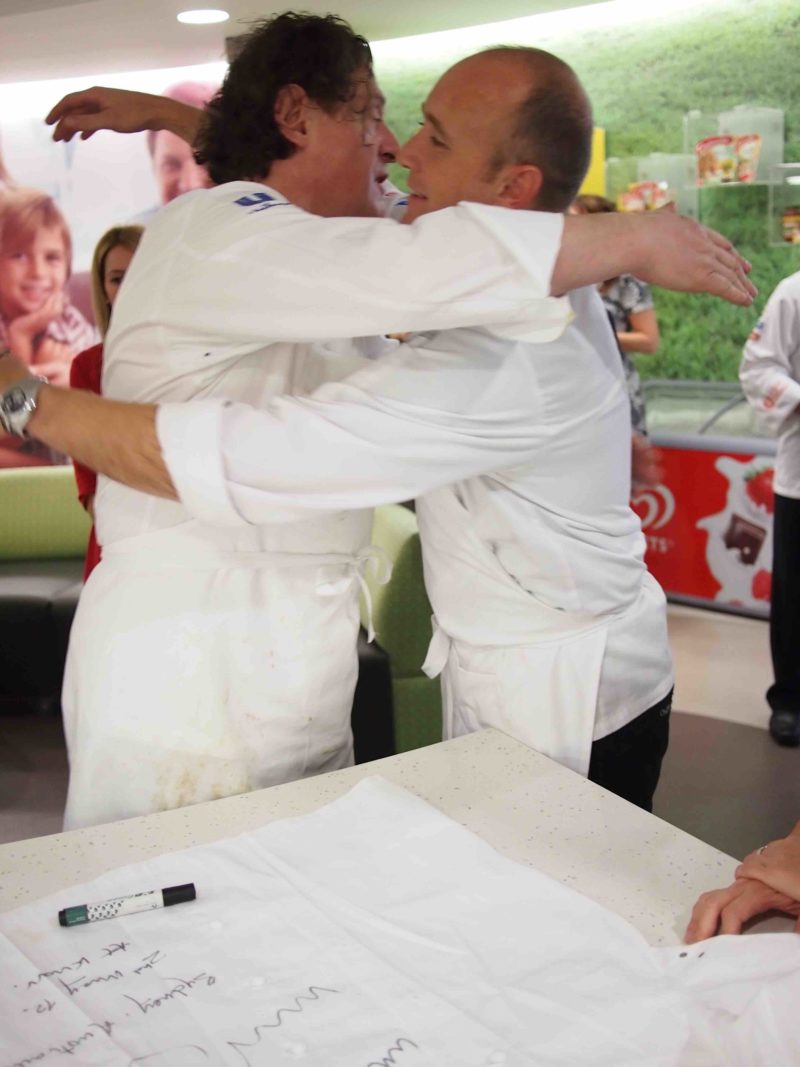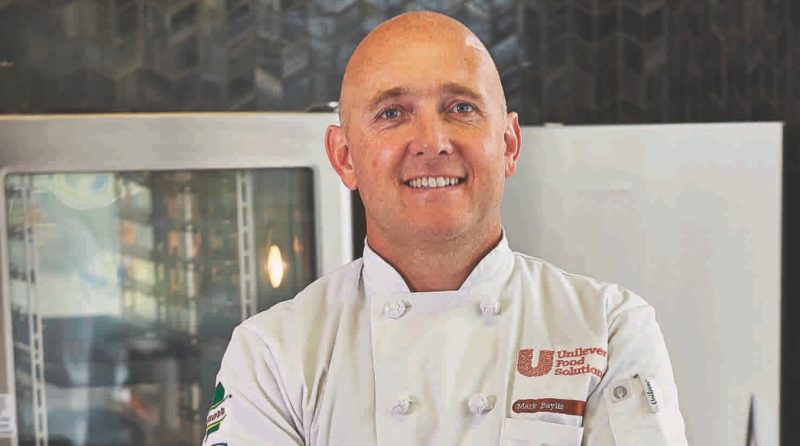A top chef who has moved seamlessly into the corporate world, Mark’s influence now spreads far beyond the walls of a single restaurant, and his stint with Marco Pierre White was a revelation. In his words,
“I always wanted to be a chef. Watching mum cook in the kitchen started me on my journey. I loved being involved. I’ve never wanted to be anything else. I think most chefs don’t fit in to the school mode very well. Born in New Zealand, I commenced my apprenticeship at Wellington Polytech, first year, but I always wanted to move to Australia as a very young age – at 11, to run away from home and go to Australia seemed a great idea!

Andrew Ballard and Mark Baylis – tools ready
The pull was incredibly strong, and I moved to Australia at 16, after my family had moved to Orange! Orange? Where was that? I had no idea, but I loved surfing, saw a picture of a young grommet surfing in Manly so I decided that was what I wanted to do. I really had no idea that Orange was nowhere near the ocean! NZ doesn’t have the size and vastness of Australia, and it was a big disappointment. Nice town, but I really wanted to be on a beach.
I finished my second year at Orange TAFE and moved to the northern beaches in Sydney, and went to Ryde College. I worked in Italian restaurants, but cut my teeth in Spotless, that gave me great foundations of scale and catering.
I remember so clearly, walking into the Spotless catering kitchen on my first day, in my brand-new chef’s uniform, and the boss told me, ‘you’re not going to be cooking anything just yet, you’ve got to learn how to wash the dirty dishes before you get clean ones.’
He was tough, but there wasn’t anything he didn’t know about cooking, and just cleaning those dishes taught me heaps about the ebb and flow of a big commercial kitchen. If I had known that years later, I’d be working side by side with Marco Pierre White, I would have scrubbed even harder!
“It’s a real journey and I think you’re an apprentice for your whole life.”
In that huge organization, you learnt how to do everything from the bottom up. At the time, I was “are you serious?” it was hard, but grounded me, and put me across the entire spectrum of kitchen operations. It’s burnt into my brain, and was great training as a corporate chef.
A couple of years out of my apprenticeship, I worked for Mark Scanlon and Mark Dickey, who own the Garfish Restaurants in Sydney. One of their first places was Café Stivelle in the late 80s, and it was on the cusp of modern Australian fusion – Neil Perry then was leading the charge.

Chef Marco PW and Mark going for the hug
As a young chef, I got a lot of inspiration from those guys. Leading the kitchen was a Kiwi guy, Stuart Wilkins, who wasn’t even a qualified chef, but could he cook! The way Stuart worked with food, he was an absolute natural. I loved being a chef, but really didn’t know a lot about food. It’s a real journey and I think you’re an apprentice for your whole life.
At college, you learn the fundamentals if you’re lucky and take note, but without that, for some people it’s a freer more organic process to do it yourself. He taught me how to be passionate and love food. And training or not, whatever he plated was gold. For me it was eye opening.
I was at Cottage Point Inn for a year, and then my first head chef’s job was at Tattler’s in St. Ives – I applied all my experience into that café, we grew week on week, month on month, and it boomed. That was much to the surprise of everyone, after a faulty start by another chef. It was good for my soul.
My journey carried on with Mark and Mark at Café Stivelle, they wanted to go the fine dining route, so they opened Jasper’s in Hunters Hill, and Milson’s in Kirribilli. I’d been elsewhere, in Fiji, at Plantation Island Resort, but visa problems interfered, and I had my eye on a fine dining career, so eventually came back to Milson’s because of my fine dining experience and they knew me.
This gig was with another chef Joanne McRae – from Tony Bilson’s stable. We joined together with the singular aim of getting chefs’ hats. And you know what?
Chefs’ hats don’t guarantee a successful business. So much of the time I’m disappointed. I a big fan of Morgan McGlone, who does the best southern fried chicken I’ve ever had! He trained under Sean Brock, a renowned Louisiana chef, brought that recipe and food style back to Australia, and I love it. Try his chicken sandwich – it’s a kick ass chicken burger and is amazing.
Chin Chin in Melbourne is incredible. They’re not chasing hats, just doing good food. So back to working with Joanne at Milson’s, we got our first hat in 1997. I started being really interested in Asian fusion food – so I took care of that, Joanne did the classical dishes so we could please the critics and the public. So, I had my first chefs’ hat at 27. I was so proud, but also very aware that I didn’t do it just by myself, Joanne was a large part of that and Mark and Mark providing the stage on which to craft our skills
At Milson’s I learnt how to make killer quince paste, which Peter Howard loved and promoted on radio. He’s a super guy, and Peter Gilmore was working in our pastry section – I’d known Pete for a while, and he elevated our pastry to the next level. Looking back now, he wasn’t just any old chef!
Although with lots of highlights in my chef’s life, I joined Unilever, and got to work with Marco Pierre White for 3 solid days. I didn’t leave his side! We sponsored him as an ambassador for our Knorr brand. How did I find him? He’s an absolute gentleman. I found him such an intense personality with hands the size of plates. If he bellowed at you in the kitchen, you’d know it. He’s a force of nature.
He has a natural feel for food – he makes it look effortless, and you go ‘wow’ how did he do that? You forget, almost, getting caught up in commercial kitchens, just where it all starts. Marco stripped some bad habits away from me and taught me about the layering of flavours in dishes again. I still do a sauce he taught me, “Marco Pierre White’s sauce” – he reduces Worcestershire, with other ingedients, adds cream and it makes the humblest meat taste fantastic.
He’s crap with Asian, though! He’s a big fan now of what he calls, ‘bottle cookery’. That made me laugh, but he’s unpretentious and great fun.
Looking at the industry now and why did I make the leap to big business? Kitchens and the hours are a young person’s game – you work hard, play hard, eventually I felt that the cheffing industry wasn’t conducive to having a personal life. I wanted a change, but still within hospitality. I just didn’t want to stay in kitchens, I felt I was worth more than the pay on the hourly rate I was earning. And the hours were huge.
Unilever is a corporate world – dealing with the dynamics of a big organization you need to be strategic and business oriented (I had my own businesses before making the leap into big business and I learnt fast). You need to understand supply, sales, R & D processes and marketing, so Unilever was the place I could use all my experience in the one job. It was a perfect fit for me.
I love the variety. On a day to day level I could be developing new products, working alongside our food technologists or I could be supporting our sales teams teaching them about the world of chefs. Some days I could be giving a master class to a big customer of ours and recently delivered to Gate Gourmet, and Compass – both huge worldwide catering businesses, and I have to understand their businesses first before I even begin to show them anything.
We just created a book, “Go Big or Go Home”, the purpose of which is to utilize our products – our philosophy is we don’t just sell a product, we sell a solution. Because of the skill and chef shortage, chefs and restaurateurs need help to deliver top food still, but using time wisely. Our Knorr and Hellman’s ranges were both developed by chefs. They’re great products! We don’t ever tell chefs how to cook or even what they should use in a dish, we provide products that make their lives just that bit easier.
Apart from being a corporate chef, I’ve got a side business now with my wife, called Marlie’s Eatery. We do food at markets, catering, in a pop-up mobile kitchen, and we specialize in Asian/American fusion food, like rolls, wraps and bowls. It’s my way of staying relevant in the market place, keeping my energy up and interest in the game. It’s keeping me exploring the industry.
My advice to young kids? Have passion – if you love food, and you like the industry, then do it. It is a great career, and there’s so many options, if you want to become a celebrity, that option’s there – there’s luck involved, but I believe you create your own luck. You will always have a job, so make sure you are looked after, and rewarded for your dedication, and if not? Do something about it.
We need fair work for everybody, and as chefs we have a responsibility for providing the next generation with a healthy, supportive industry.
But make sure you love what you’re doing – because it’s a long road if you don’t.”
Thank you Mark, it was a pleasure to hear your take on the industry, and we do hear you. We all need a better, more sustainable industry, and that starts with the players in it. Together, we will rise.
Chrissie 🙂



